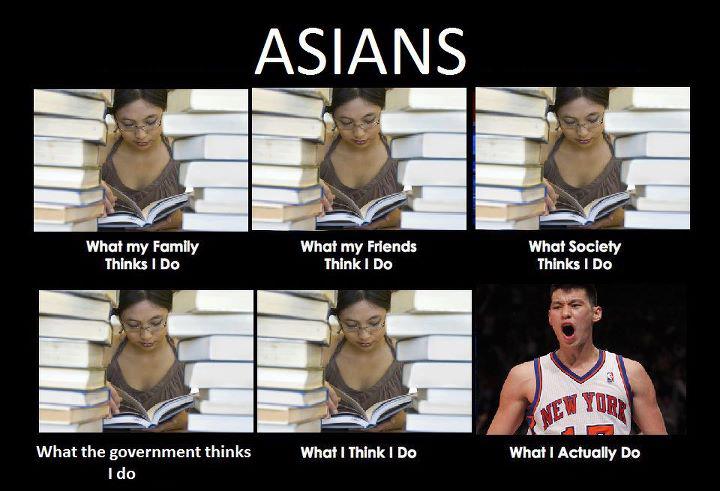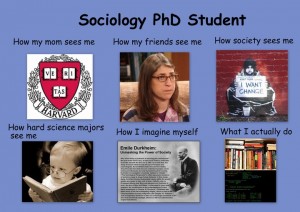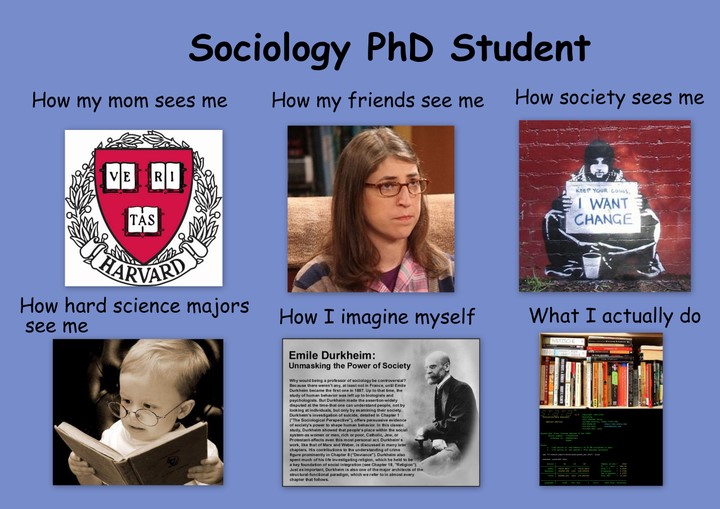It was Saint Patrick’s Day- and spring had finally come to Boston. I was walking back home after a long day at the office- that was when I saw him, a heavily built, almost scary-looking man, standing near a street lamp drinking something from a bottle. The street was almost empty, the daylight quickly fading and I could not help hastening my step a bit. As I walked past him, he looked at me and started to speak.
“Happy Saint Patrick’s Day!” he said, with a sudden wide smile.
That was not at all what I have expected.
Earlier this year, on social networks (Facebook and the Chinese equivalent Renren), a series of photos suddenly became very popular. One of my all-time favorites was something like this:

Of course, similar pictures exist for numerous occupations, college majors or lifestyles, showing “what I actually do” is quite different from “what society and others think I do”. Following the trend, I even made one myself just for Sociology PhD students.
Although such pictures are mainly intended for a good laugh, somehow there is a grain of truth hidden within: The “reality” of things is often very different from people’s perceptions- even though the perceptions are sometimes quite widespread and therefore seem “legit”. Boys are better at Math than girls” or “Asians are nerds” – those are such perceptions. A more “scientific” language may refer to them as “stereotypes/stereotyping” and this is what I want to talk about today. As much as we want to deny it, certain negative stereotypes exist about certain groups of people. And sometimes, we have taken a slice of reality and over-generalize that for a whole population : like Chinese people are dog-eaters or feet-binders. I remember till this day that when I first came to the US as a high school exchange student, in the first session of our AP history class, one of my classmates asked me- why don’t you have your feet bound? The negative stereotype and over-generalization is like the scarlet letter- with this burnt on the forehead of the group, any individual from this group will be judged before s/he is known. A quick google search will tell you how scholars (psychologists, sociologists, etc.) have empirically found that stereotype threat undermines performances in a variety of domains. This finding is not difficult to grasp- just imagine how difficult it would be to make something of yourself when everyone around you firmly believes that you are destined to fail.
And how difficult it would be to show your true color when everyone around you firmly believes that you “should be” something else.
And how difficult it would be really to get to know someone when you have already rendered the judgment.
In Le Petit Prince, Antoine de Saint-Exupéry wrote that “What is essential is invisible to the eyes” (L’essentiel est invisible pour les yeux.) In the movie Mona Lisa Smile, there is a quote that goes like this: “But not all who wander are aimless, especially those who seek truth beyond tradition, beyond definition, beyond the image.”
True, it might be easier to see the world in stereotypes- what you would miss though, is the “truth” beyond the image, which is often tender and gentle, like that smile from a nice stranger on Saint Patrick’s Day.
今年的St. Patrick日,波士顿已经渐渐有了春意。傍晚从办公室回家的路上,街角正站着一彪形大汉,暮光里,街道空无一人,于是不免加快脚步。经过他的身边,他突然展开一个极其灿烂的微笑,”St. Patrik日快乐!“——他对我说。
这完全不是我想的那样。
最近,在Facebook和人人网上,有一些列图片非常流行。这是其中我最喜欢的一张:

还有许多大学专业、职业,都有这样的图片——展现“我们真正做的”和“社会对我们的认识”间巨大的差异。我甚至为”社会学PhD”也做了一张:

尽管这样的图片多数不过为了搞笑,然而却不能否认,其中有一丝隐隐的真相。事情的真相往往和人们的认知很不一样。尽管这认知可能因为其普遍公认——因而被视为是正确的。“男孩数学学得更好”或者“亚洲学生都是书呆子”——这便是这样的认知,而一个更学术的话语,将这种认知定义为“刻板印象”。
尽管我们十分不愿意承认,但是对于某些群体的刻板印象却是确实存在的。我们选取事实的一小部分,将其放大,过度总体化以指代一个群体。一个例子是,中国人都吃狗肉,或缠足。我至今都记得,当我高中第一次作为交流学生来美国时,在第一节AP历史课上,我的一个同学问我,“你怎么不缠足呢?”。这样的过度总体化与刻板印象就好像霍桑的红字——当它被烙在一个群体上时,我们往往便形成了对这个群体中个体先入为主的意见,而不再对他们进行深入的真正的了解。而许多社会学与心理学的研究也发现,刻板印象对于个体的发展和表现有着负面的影响——这一点其实并不难理解:在所有人都认为你注定失败时,取得成功,该是一件多么难上加难的事情。
而当周围人都觉得你“应该”如何时,表现自我,该是一件多么难上加难的事情。
在《小王子》里,Antoine de Saint-Exupery写道,“真正重要的东西是眼睛看不见的“。而电影《蒙娜丽莎的微笑》里,有这样一段话:”并非所有漂泊都漫无目的,尤其是,当你试图寻找传统、定义与表象下的真相。“
或许,带着刻板印象看问题的确更加容易。然而,这是,你便错过了那些表象外的真相。这样的真想往往温柔微婉,好像St. Patrick日街角,那个陌生人的微笑。


